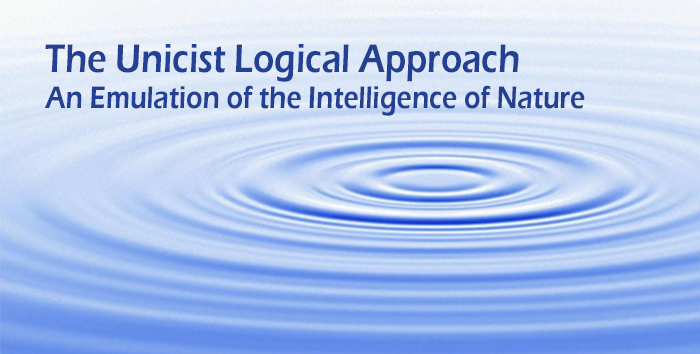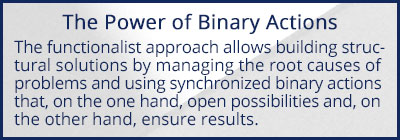The Unicist Research Institute
Pioneers in Complexity Science Research since 1976




Main Discoveries in Adaptive Educational Processes
The R&D in the field of education began in the seventies. It was centrally focused on finding the drivers of human learning in the field of adaptive behavior. It drove to the discovery of the structure of those learning processes that promote adaptiveness and the generation of added value in an environment.

The Scientific Collaboration Space has been designed to give access to the unicist paradigm shift in sciences made by the Unicist Theory and to the upgrades this change produced in different application fields.
Intrapersonal Intelligence
- The Unicist Ontology of Inner Freedom
- The Unicist Ontology of Reflection
- The Unicist Ontology of Consciousness
- The Unicist Ontology of Assimilation / Introjection Processes
- The Unicist Ontology of Discrimination Power
- Stages of the Consciousness Building Process
- The Unicist Ontology of Internal Speed
- The Unicist Ontology of forward-chaining and backward-chaining thinking
- The Relation between Complexity Management and Human Fears
- The Unicist Ontology of Languages as Reasoning Structures
- The Unicist Ontology of the Apprehension of Ontologies
- The Unicist Ontology of Decision Making
- Development of the Unicist Q Method
Interpersonal Intelligence
- The Unicist Ontology of External Freedom
- The Unicist Ontology of Proactive Responsibility
- The Unicist Ontology of the Solitude of Power
- The Unicist Ontology of Credibility
- The Unicist Ontology of Ambiguous Language
- The Unicist Ontology of Ambiguous Perception
- The Unicist Ontology of the Use of Words in the Building of Minimum and Maximal Strategies
- The Unicist Ontology of Language
- The Unicist Ontology of Messages
- The Unicist Ontology of Words’ Functionality
- The Unicist Ontology of Figurative Communication
Human Learning Basics
- The Unicist Ontology of Human Learning
- The basics of Learning New Skills to Solve Complex Problems
- The Unicist Ontology of Personal Power
- The Unicist Ontology of Learning Processes
- The Unicist Ontology of the Adults' Learning Context
- The Unicist Ontology of the Ethical Intelligence
- The Unicist Ontology of Wisdom
- The Structure of Ontointelligence
- The Unicist Ontology of Doers
- The Unicist Ontology of Reading the Nature of Reality
- The Ontogenesis of Ethical Intelligence
- The Unicist Ontology of Emulation of Reality
- The Unicist Taxonomy of Complex Problem Solving
- The Unicist Ontology of Innovation
- The Unicist Ontology of Fundamental and Technical Analysis
- The Unicist Ontology of Leadership
- The Unicist Ontology of Ambiguity
- The Unicist Ontology of Research
- Discovery and Development of Learning Objects
- Development of the Unicist Ontology of Erudition and Wisdom
- Development of Unicist Semantic Objects
- Development of Unicist Learning Objects
- The Unicist Ontology of Words' Functionality
- The Unicist Ontology of Figurative Communication
Translate
The Unicist Paradigm Shift in Sciences
The unicist approach to complexity emulates nature to deal with natural or artificial complex adaptive systems. Such emulation is based on the discovery of the ontogenetic intelligence of nature that regulates the evolution of living beings and natural entities.
The Unicist Theory explains the dynamics and evolution of living beings and complex adaptive entities. It substituted empiricism by a pragmatic, structuralist and functionalist approach and replaced knowledge falsification processes with destructive testing processes.
The four pillars of the paradigm shift in science are:
- 1) The unicist theory, which explains the dynamics and evolution of living beings and complex adaptive entities.
- 2) The unicist theory of evolution, which allows forecasting future scenarios.
- 3) The epistemological structure of complexity sciences, which allows managing the complex aspects of reality.
- 4) The unicist theory of the unified field in nature, which allows managing the unified field of complex adaptive systems.

Country Archetypes Developed
• Algeria • Argentina • Australia • Austria • Belarus • Belgium • Bolivia • Brazil • Cambodia • Canada • Chile • China • Colombia • Costa Rica • Croatia • Cuba • Czech Republic • Denmark • Ecuador • Egypt • Finland • France • Georgia • Germany • Honduras • Hungary • India • Iran • Iraq • Ireland • Israel • Italy • Japan • Jordan • Libya • Malaysia • Mexico • Morocco • Netherlands • New Zealand • Nicaragua • Norway • Pakistan • Panama • Paraguay • Peru • Philippines • Poland • Portugal • Romania • Russia • Saudi Arabia • Serbia • Singapore • Slovakia • South Africa • Spain • Sweden • Switzerland • Syria • Thailand • Tunisia • Turkey • Ukraine • United Arab Emirates • United Kingdom • United States • Uruguay • Venezuela • Vietnam
Main Markets (Generic)
• Automobile • Food • Mass consumption • Financial • Insurance • Sports and social institutions • Information Technology (IT) • High-Tech • Knowledge Businesses • Communications • Perishable goods • Mass media • Direct sales • Industrial commodities • Agribusiness • Healthcare • Pharmaceutical • Oil and Gas • Chemical • Paints • Fashion • Education • Services • Commerce and distribution • Mining • Timber • Apparel • Passenger transportation –land, sea and air • Tourism • Cargo transportation • Professional services • e-market • Entertainment and show-business • Advertising • Gastronomic • Hospitality • Credit card • Real estate • Fishing • Publishing • Industrial Equipment • Construction and Engineering • Bike, motorbike, scooter and moped • Sporting goods
Copyright© 2024
The Unicist Research Institute























